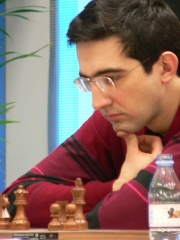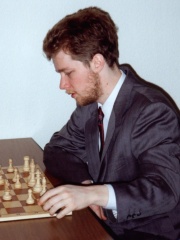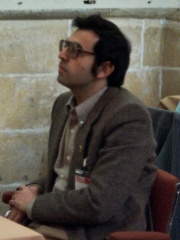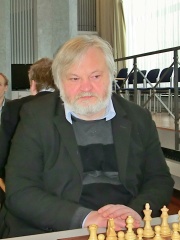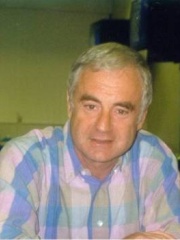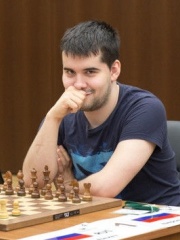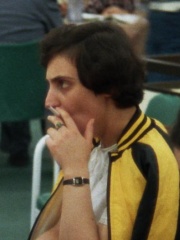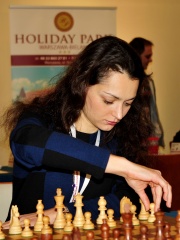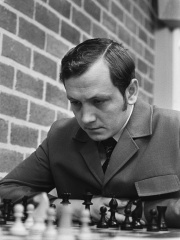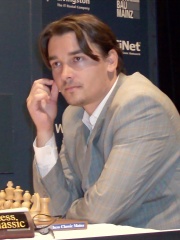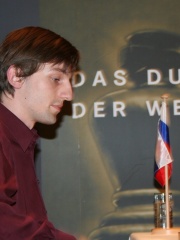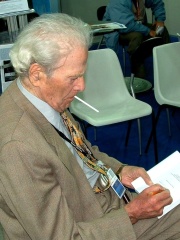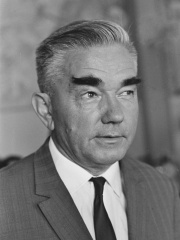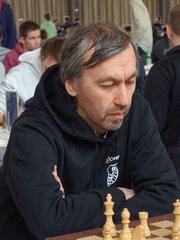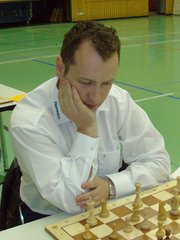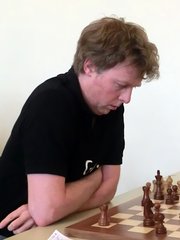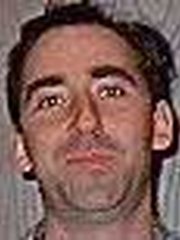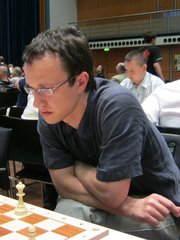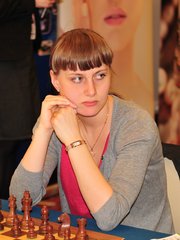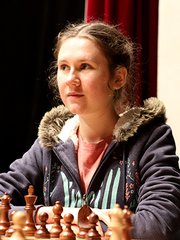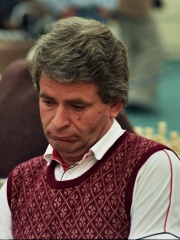
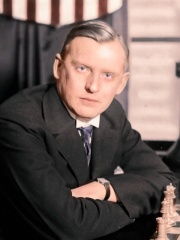
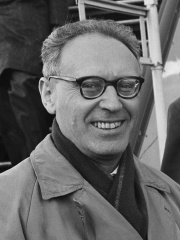

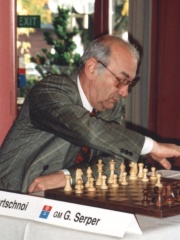
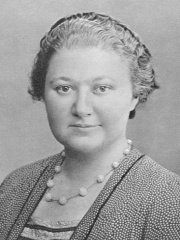
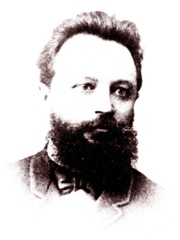
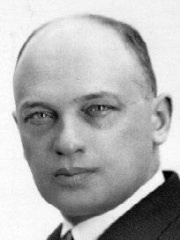
The Most Famous
CHESS PLAYERS from Russia
This page contains a list of the greatest Russian Chess Players. The pantheon dataset contains 461 Chess Players, 88 of which were born in Russia. This makes Russia the birth place of the most number of Chess Players.
Top 10
The following people are considered by Pantheon to be the top 10 most legendary Russian Chess Players of all time. This list of famous Russian Chess Players is sorted by HPI (Historical Popularity Index), a metric that aggregates information on a biography's online popularity. Visit the rankings page to view the entire list of Russian Chess Players.

1. Boris Spassky (1937 - 2025)
With an HPI of 78.00, Boris Spassky is the most famous Russian Chess Player. His biography has been translated into 73 different languages on wikipedia.
Boris Vasilyevich Spassky (Russian: Борис Васильевич Спасский; January 30, 1937 – February 27, 2025) was a Soviet and Russian chess grandmaster who was the tenth World Chess Champion, holding the title from 1969 to 1972. Spassky played three world championship matches: he lost to Tigran Petrosian in 1966; defeated Petrosian in 1969 to become world champion; then lost to Bobby Fischer in a famous match in 1972. Spassky won the Soviet Chess Championship twice outright (1961, 1973), and twice lost in playoffs (1956, 1963), after tying for first place during the event proper. He was a World Chess Championship candidate on seven occasions (1956, 1965, 1968, 1974, 1977, 1980, 1985). In addition to his Candidates wins in 1965 and 1968, Spassky reached the semi-final stage in 1974 and the final stage in 1977. Spassky immigrated to France in 1976 and became a French citizen in 1978. He continued to compete in tournaments, but was no longer a major contender for the world title. Spassky lost an unofficial rematch against Fischer in 1992. In 2012, he left France and returned to Russia.

2. Alexander Alekhine (1892 - 1946)
With an HPI of 75.55, Alexander Alekhine is the 2nd most famous Russian Chess Player. His biography has been translated into 69 different languages.
Alexander Aleksandrovich Alekhine (October 31 [O.S. October 19] 1892 – March 24, 1946) was a Russian and French chess player and the fourth World Chess Champion, a title he held for two reigns. By the age of 22, Alekhine was already among the strongest chess players in the world. During the 1920s, he won most of the tournaments in which he played. In 1921, Alekhine left Soviet Russia and emigrated to France, which he represented after 1925. In 1927, he became the fourth World Chess Champion by defeating José Raúl Capablanca. In the early 1930s, Alekhine dominated tournament play and won two top-class tournaments by large margins. He also played first board for France in five Chess Olympiads, winning individual prizes in each (four medals and a brilliancy prize). Alekhine offered Capablanca a rematch on the same demanding terms that Capablanca had set for him, and negotiations dragged on for years without making much progress. Meanwhile, Alekhine defended his title with ease against Efim Bogoljubov in 1929 and 1934. He was defeated by Max Euwe in 1935, but regained his crown in the 1937 rematch. His tournament record, however, was uneven, and rising young stars like Paul Keres, Reuben Fine, and Mikhail Botvinnik threatened his title. Negotiations for a title match with Keres or Botvinnik were halted by the outbreak of World War II in Europe in 1939. Negotiations with Botvinnik for a world title match were proceeding in 1946 when Alekhine died in Portugal, in unclear circumstances. Alekhine is the only World Chess Champion to have died while holding the title. Alekhine is known for his fierce and imaginative attacking style, combined with great positional and endgame skill. He is highly regarded as a chess writer and theoretician, having produced innovations in a wide range of chess openings and having given his name to Alekhine's Defence and several other opening variations. He also composed some endgame studies.

3. Mikhail Botvinnik (1911 - 1995)
With an HPI of 75.14, Mikhail Botvinnik is the 3rd most famous Russian Chess Player. His biography has been translated into 69 different languages.
Mikhail Moiseyevich Botvinnik (Russian: Михаи́л Моисе́евич Ботви́нник; IPA: [mʲɪxɐˈil məɪˈsʲejɪvʲɪdʑ‿bɐˈtvʲinʲːɪk]; August 17 [O.S. August 4] 1911 – May 5, 1995) was a Soviet and Russian chess grandmaster who held five world titles in three different reigns. The sixth World Chess Champion, he also worked as an electrical engineer and computer scientist and was a pioneer in computer chess, the last of which he was awarded an honorary mathematics degree for. Botvinnik was the first world-class player to develop within the Soviet Union. He played a major role in the organization of chess, making a significant contribution to the design of the World Chess Championship system after World War II and becoming a leading member of the coaching system that enabled the Soviet Union to dominate top-class chess during that time. His pupils include World Champions Anatoly Karpov, Garry Kasparov, and Vladimir Kramnik. He is often described as the patriarch of the Soviet chess school and is revered for his analytical approach to chess.

4. Anatoly Karpov (b. 1951)
With an HPI of 74.74, Anatoly Karpov is the 4th most famous Russian Chess Player. His biography has been translated into 77 different languages.
Anatoly Yevgenyevich Karpov (Russian: Анато́лий Евге́ньевич Ка́рпов, IPA: [ɐnɐˈtolʲɪj jɪvˈɡʲenʲjɪvʲɪtɕ ˈkarpəf]; born May 23, 1951) is a Russian and former Soviet chess grandmaster, former World Chess Champion, and politician. He was the 12th World Chess Champion from 1975 to 1985, a three-time FIDE World Champion (1993, 1996, 1998), twice World Chess champion as a member of the USSR team (1985, 1989), a six-time winner of Chess Olympiads as a member of the USSR team (1972, 1974, 1980, 1982, 1986, 1988), and the 1st World Rapid Chess Champion (1988). The International Association of Chess Press awarded him nine Chess Oscars (1973–77, 1979, 1980, 1981, 1984). For 25 consecutive years (1974 — 1998), Karpov was either the world champion (16 years in total) or a world championship challenger, a record surpassed only by Emanuel Lasker. Karpov's chess tournament successes include over 160 first-place finishes. He had a peak Elo rating of 2780, and his 102 total months world number one is the third-longest of all time, behind Magnus Carlsen and Garry Kasparov. Karpov is also an elected Member of the State Duma in Russia. Since 2006, he has chaired the Commission for Ecological Safety and Environmental Protection of the Civic Chamber of the Russian Federation, and since 2007 he has been a member of the Public Council under the Ministry of Defence. He is currently the oldest living World Chess Champion.
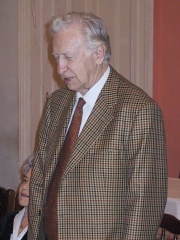
5. Vasily Smyslov (1921 - 2010)
With an HPI of 72.03, Vasily Smyslov is the 5th most famous Russian Chess Player. His biography has been translated into 60 different languages.
Vasily Vasilyevich Smyslov (Russian: Васи́лий Васи́льевич Смысло́в, romanized: Vasíliy Vasíl'yevich Smyslóv; 24 March 1921 – 27 March 2010) was a Soviet and Russian chess grandmaster who was the seventh World Chess Champion from 1957 to 1958. He was a Candidate for the World Chess Championship on eight occasions (1948, 1950, 1953, 1956, 1959, 1965, 1983, and 1985). Smyslov twice tied for first place at the USSR Chess Championships (1949, 1955), and his total of 17 Chess Olympiad medals won is an all-time record. In five European Team Championships, Smyslov won ten gold medals. Smyslov remained active and successful in competitive chess well over the age of sixty. Despite his failing eyesight, he remained active in the occasional composition of chess problems and studies until shortly before his death in 2010. Besides chess, he was an accomplished baritone singer.

6. Viktor Korchnoi (1931 - 2016)
With an HPI of 69.66, Viktor Korchnoi is the 6th most famous Russian Chess Player. His biography has been translated into 53 different languages.
Viktor Lvovich Korchnoi (Russian: Виктор Львович Корчной, IPA: [vʲiktər ˈlʲvovʲɪtɕ kɐrtɕˈnoj]; 23 March 1931 – 6 June 2016) was a Soviet (before 1976) and Swiss (after 1980) chess grandmaster (GM) and chess writer. He is considered one of the strongest players never to have become World Chess Champion. Born in Leningrad, Korchnoi defected to the Netherlands in 1976, and resided in Switzerland from 1978, becoming a Swiss citizen. Korchnoi played four matches against GM Anatoly Karpov, three of which were official. In 1974, Korchnoi lost to Karpov in the Candidates Tournament final. After GM Bobby Fischer declined to defend his title against Karpov, Karpov was declared World Champion in 1975. In 1978 and 1981, Korchnoi won consecutive Candidates cycles and qualified to challenge Karpov for the World Chess Championship, but lost both matches. The two players also played a drawn training match of six games in 1971. Korchnoi was a candidate for the World Championship on ten occasions (1962, 1968, 1971, 1974, 1977, 1980, 1983, 1985, 1988, and 1991). He was also four times a USSR Chess Champion, five times a member of Soviet teams that won the European championship, and six times a member of Soviet teams that won the Chess Olympiad. He played competitive chess until old age. At age 75, he won the 2006 World Senior Chess Championship and became the oldest person ever to be ranked among the world's top 100 players.

7. Vera Menchik (1906 - 1944)
With an HPI of 67.60, Vera Menchik is the 7th most famous Russian Chess Player. Her biography has been translated into 44 different languages.
Vera Francevna Mencikova (Russian: Вера Францевна Менчик, Vera Frantsevna Menchik; Czech: Věra Menčíková; 16 February 1906 – 26 June 1944), was a Russian-born Czechoslovak chess player who primarily resided in England. She was the first and longest-reigning Women's World Chess Champion from 1927 to 1944, winning the championship a record eight times primarily in round-robin tournaments. In an era when women primarily competed against other women, Menchik was the first and only woman competing in master-level tournaments with the world's best players. Menchik was born in Moscow to a Czech father and English mother. She began playing chess competitively in school at age 14 not long before the Russian Revolution led her family to leave Russia and move to England in 1921. She joined the Hastings Chess Club in 1923, where she began training with James Drewitt and Géza Maróczy. Menchik established herself as the best female player in the country in 1925 by defeating the British women's champion Edith Price in two matches, and then the world by winning the inaugural Women's World Chess Championship in 1927. Menchik began competing in master-level tournaments in 1928. Following her first big success at Ramsgate in 1929 when she shared second place with Akiba Rubinstein, she was regularly invited to these elite events for the next decade, including the local Hastings Congress. Her best result in the Hastings Premier tournament was in 1931/32 when she defeated future world champion Max Euwe and Mir Sultan Khan. Late in her career, Menchik won a lone Women's World Championship match against Sonja Graf, the next-leading female player of her era. Menchik was active until her death in 1944, when she was killed in a German air raid that destroyed her home during the Second World War. Menchik was the dominant female chess player before the war, winning at least 59 games in a row at the Women's World Championship tournaments. Highlights of her successes against male players included two victories and a positive score against Euwe and a positive score in 29 known games against George Thomas, who received the International Master (IM) title. Master-level players that Menchik defeated were said to be members of the Vera Menchik Club, which included six players who received the Grandmaster (GM) title or the honorary equivalent. The trophy for the winning team at the Women's Chess Olympiad is named the Vera Menchik Cup in her honour.

8. Mikhail Chigorin (1850 - 1908)
With an HPI of 66.97, Mikhail Chigorin is the 8th most famous Russian Chess Player. His biography has been translated into 43 different languages.
Mikhail Ivanovich Chigorin (also Tchigorin; Russian: Михаи́л Ива́нович Чиго́рин; 12 November [O.S. 31 October] 1850 – 25 January [O.S. 12 January] 1908) was a Russian chess player. He played two World Championship matches against Wilhelm Steinitz, losing both times. The last great player of the Romantic chess style, he also served as a major source of inspiration for the "Soviet chess school", which dominated the chess world in the middle and latter parts of the 20th century.

9. Savielly Tartakower (1887 - 1956)
With an HPI of 65.98, Savielly Tartakower is the 9th most famous Russian Chess Player. His biography has been translated into 34 different languages.
Savielly Tartakower (also known as Xavier or Ksawery Tartakower, less often Tartacover or Tartakover; 21 February 1887 – 4 February 1956) was a Austro-Hungarian by birth, then Polish, later naturalised French chess player. He was awarded the title of International Grandmaster in its inaugural year, 1950. Tartakower was also a leading chess journalist and author of the 1920s and 1930s and is noted for his many witticisms. During World War II, he joined the French Resistance under the name "Lieutenant Cartier."
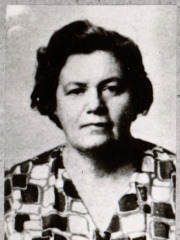
10. Olga Rubtsova (1909 - 1994)
With an HPI of 63.83, Olga Rubtsova is the 10th most famous Russian Chess Player. Her biography has been translated into 36 different languages.
Olga Nikolayevna Rubtsova (Russian: О́льга Никола́евна Рубцо́ва; 20 August 1909 – 13 December 1994) was a Soviet chess player and the fourth women's world chess champion. In 2015, she was inducted into the World Chess Hall of Fame.
People
Pantheon has 88 people classified as Russian chess players born between 1799 and 2002. Of these 88, 59 (67.05%) of them are still alive today. The most famous living Russian chess players include Anatoly Karpov, Vladimir Kramnik, and Alexander Khalifman. The most famous deceased Russian chess players include Boris Spassky, Alexander Alekhine, and Mikhail Botvinnik. As of April 2024, 10 new Russian chess players have been added to Pantheon including Gata Kamsky, Konstantin Landa, and Pavel Tregubov.
Living Russian Chess Players
Go to all RankingsAnatoly Karpov
1951 - Present
HPI: 74.74
Vladimir Kramnik
1975 - Present
HPI: 60.13
Alexander Khalifman
1966 - Present
HPI: 58.42
Lev Alburt
1945 - Present
HPI: 55.15
Artur Yusupov
1960 - Present
HPI: 54.91
Gennadi Sosonko
1943 - Present
HPI: 54.66
Ian Nepomniachtchi
1990 - Present
HPI: 53.72
Irina Levitina
1954 - Present
HPI: 53.26
Alexandra Kosteniuk
1984 - Present
HPI: 52.46
Yuri Balashov
1949 - Present
HPI: 50.40
Alexander Morozevich
1977 - Present
HPI: 50.07
Alexander Grischuk
1983 - Present
HPI: 49.86
Deceased Russian Chess Players
Go to all RankingsBoris Spassky
1937 - 2025
HPI: 78.00
Alexander Alekhine
1892 - 1946
HPI: 75.55
Mikhail Botvinnik
1911 - 1995
HPI: 75.14
Vasily Smyslov
1921 - 2010
HPI: 72.03
Viktor Korchnoi
1931 - 2016
HPI: 69.66
Vera Menchik
1906 - 1944
HPI: 67.60
Mikhail Chigorin
1850 - 1908
HPI: 66.97
Savielly Tartakower
1887 - 1956
HPI: 65.98
Olga Rubtsova
1909 - 1994
HPI: 63.83
Yuri Averbakh
1922 - 2022
HPI: 63.71
Andor Lilienthal
1911 - 2010
HPI: 63.46
Alexander Kotov
1913 - 1981
HPI: 60.93
Newly Added Russian Chess Players (2025)
Go to all RankingsGata Kamsky
1974 - Present
HPI: 52.92
Konstantin Landa
1972 - 2022
HPI: 42.65
Pavel Tregubov
1971 - Present
HPI: 42.64
Alexander Goldin
1964 - Present
HPI: 42.10
Vadim Zvjaginsev
1976 - Present
HPI: 40.39
Konstantin Sakaev
1974 - Present
HPI: 39.85
Maxim Matlakov
1991 - Present
HPI: 33.43
Maria Kursova
1986 - Present
HPI: 32.79
Olga Girya
1991 - Present
HPI: 31.76
Polina Shuvalova
2001 - Present
HPI: 30.07
Overlapping Lives
Which Chess Players were alive at the same time? This visualization shows the lifespans of the 25 most globally memorable Chess Players since 1700.

